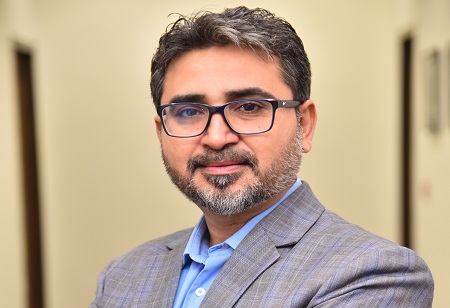
Manish Misra is the Chief Innovation Officer at Panasonic Life Solutions India, spearheading the company’s Innovation Centre based in Bangalore. In his existing role, he is responsible for driving Innovation to shape future products & solutions for Panasonic in India and markets beyond. With more than two decades of experience, Manish started his career with IBM where he spent almost 19 years across various engineering and R&D leadership roles.
In the past decade, the concept of Industry 4.0, pioneered by Germany, has captured the imagination of industrialized nations, worldwide. It revolves around the creation of "intelligent factories" where machines possess the ability to monitor and make decentralized decisions regarding production and maintenance. However, Japan has taken a step further by envisioning "Society 5.0," a technology-driven society that places humans at its core. Society 5.0 aims to transcend industrial transformation and build a "Super Smart Society" where innovative technologies such as machine learning, artificial intelligence, robotics, and big data are integrated to address various social challenges.
Society 5.0 tackles these challenges through three broad categories: Mobility, Home, and Business. Under Mobility, autonomous driving and fleet systems leverage obstacle detection, environmental recognition, and energy-saving technologies like advanced power devices, lithium-ion battery systems, and contactless power supply systems. The Home category encompasses home automation innovations, such as smart appliances and lighting, along with sensing solutions like facial recognition entry control to detect suspicious activities. Additionally, lifestyle data analysis and emotion recognition based on behavior and activity information play a bigger role. Finally, the Business category incorporates cutting-edge technologies like the Internet of Things (IoT), machine learning, artificial intelligence, cloud and edge computing, and blockchain to optimize enterprise activities across various sectors.
Market Prospects
Market forecasts indicate promising prospects for the digital economy, particularly in India. It is estimated that India's digital economy will surpass USD 1 trillion within the next 5-7 years, with key technologies such as IoT, machine learning, artificial intelligence, and cybersecurity playing significant roles. The IoT market alone is projected to expand at a compound annual growth rate (CAGR) of 17 per cent. A report by NASSCOM suggests that data and AI considered the "next big thing," could add $450-500 billion to India's GDP by 2025. Furthermore, as per Teamlease's study, AI is expected to add $967 billion to the Indian economy by 2035.
According to industry reports, in the year 2020, India witnessed a remarkable surge in the Internet of Things (IoT) market, with its size estimated at approximately USD 5 billion. It is projected to grow to 9.3 billion U.S. dollars by 2025 as businesses continue to harness the power of interconnected devices and automation. The majority of IoT investments will be allocated to services, applications, cloud and software, including connectivity.
IoT Ecosystem: Building Blocks for Society 5.0
The IoT ecosystem serves as the foundation for Society 5.0, which has gained momentum due to shifting priorities during the COVID-19 pandemic. Businesses have gravitated towards enhanced utility and safer solutions, resulting in increased digitization and the adoption of contactless technologies and IoT-enabled appliances. The impending deployment of 5G technology, with its substantial advancements over 4G, is expected to further fuel demand for connected solutions in the country. According to syndicated research by Panasonic, approximately 81 percent of consumers are willing to invest in IoT-enabled products, indicating a growing acceptance of the smart home culture. This trend opens new growth opportunities for enterprises. For instance, offering home automation as a service allows businesses to deliver a comprehensive smart living experience to consumers through cloud-based mobile applications equipped with machine learning, artificial intelligence, data management, and analytics. Such solutions assist businesses in recognizing consumer patterns and providing relevant information regarding predictive maintenance, warranties, and more. Hence optimizing the overall supply chain, lowering the total cost of ownership, and creating economies of scale.
The road ahead
The recent interests and developments around artificial intelligence (AI) in the industry have highlighted its potential to transform various sectors of India's economy while touching various aspects of our lives. One area where its impact is particularly evident is the increasing demand for connected appliances and smart factories. Companies are now gearing up to spearhead this transformation with an innovative line of products and solutions exploring the potential of human-centered intelligent solutions in the AI era. We at Panasonic Life Solutions India indigenously developed the Miraie platform that leverages AI to create a seamless and interconnected ecosystem within homes, allowing users to control and monitor their appliances remotely through smartphones or voice commands. On the industrial front, Panasonic Miraie ProFactory is a plug-and-play IoT solution that integrates AI capabilities to optimize production processes, enabling real-time data analysis, predictive maintenance, and enhanced operational efficiency. The integration of AI into appliances and factories not only improves convenience and productivity but also sets the stage for a future where automation and connectivity play vital roles in shaping our everyday lives.
We use cookies to ensure you get the best experience on our website. Read more...